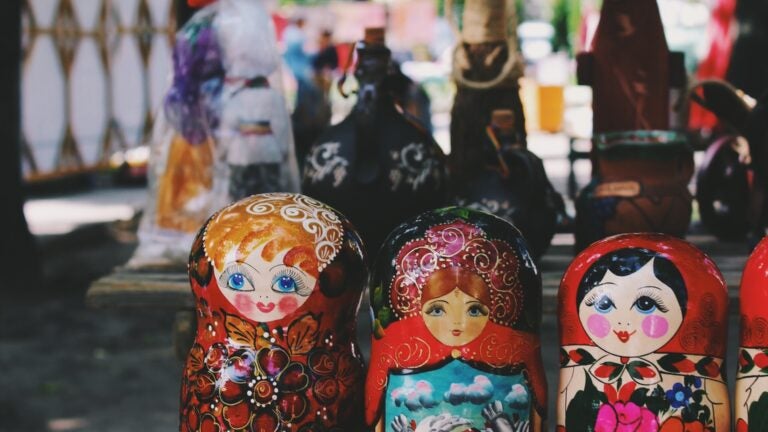
Russian is spoken by more than 250 million people across the Russian Federation and in countries that formerly belonged to the Soviet Union. It is the fifth most commonly spoken language in the world, behind Chinese, English, Hindustani and Spanish.
Knowledge of the Russian language opens the door to a fascinating culture that has exerted enormous influence on the rest of the world. Occupying the eastern boundary of Europe, Russia has both shared in and diverged from the rest of that continent. It has undergone a series of dramatic changes over the course of its history. Russia remains a strategic concern — and the U.S. State Department designates Russian as one of a handful of strategic languages the study of which is vital to U.S. foreign and military policy.
But Russian is also the language of a wonderfully rich and beautiful culture, the medium in which some of the most important works in world literature unfold. Its musical and artistic culture experienced a brilliant efflorescence in the 19th and 20th centuries. It is home to some of the most significant developments in the art of the ballet.
Majors
Minors
Courses
For the courses offered during any given term, consult the Schedule of Classes. Course availability is subject to change, and non-language courses offered by the Department of Slavic Languages and Cultures are not included.
-
RUSS 120: Beginning Russian I (4.0 units)
Introduction to the Russian language with emphasis on basic conversational skills, major points of grammar and reading.RUSS 150: Beginning Russian II (4.0 units)Continuation of RUSS 120.Prerequisite: RUSS 120 or SLL 120
RUSS 220: Intermediate Russian I (4.0 units)
Development of thematic conversational skills with emphasis on extended dialogue. Review of basic morphology with special attention to verbs of motion. Reading of authentic material is emphasized.
Prerequisite: RUSS 150 or SLL 150
RUSS 250: Intermediate Russian II (4.0 units)
Continuation of RUSS 220. Development of proficiency in conversation skills, reading and writing.
Prerequisite: RUSS 220 or SLL 220
-
SLL 310: Russian in Popular Culture (4.0 units)
Advanced conversation, reading, grammar and topical analysis of Russian press, films and other popular sources. Conducted in Russian.
Prerequisite: RUSS 250 or SLL 250
SLL 340: Intercultural Communication in Russian (4.0 units)
Advanced language training focusing on specific issues of communication with Russians. Analysis and translation of literary texts. Advanced syntax. Conducted in Russian.
Prerequisite: SLL 250
SLL 465: Seminar in Russian Studies (4.0 units, 12 max)
Readings and discussion in Russian of current topics in Russian culture, politics and society. Content varies each time offered.
Prerequisite: RUSS 250 or SLL 250
SLL 500: Topics in Advanced Russian (2.0 units, max 8)
Study of Russian required for graduate work and professional activities.
SLL 546: The Russian Novel
Genre of the novel as exemplified in the works of one or more Russian authors. Readings from Gogol, Turgenev, Tolstoy, Dostoevsky, and others.Prerequisite: three years of college Russian.
Study Abroad
Almaty-Kazakhstan (Al-Farabi Kazakh National University)
The American Councils’ Russian Language and Area Studies Program (RLASP) takes place on the campus of Al-Farabi Kazakh National University (KazNU). The classes are made up of study abroad students. Professors are from KazNu or other local universities.
The program provides approximately 20 hours per week of in-class instruction in Russian grammar, phonetics, conversation, cultural studies, and optional Kazakh language instruction. Program features include homestays, weekly excursions, travel to other regions outside the host city, conversation partners, and a wide range of opportunities to pursue volunteering opportunities, hobbies, and personal interests in a Russian-language context.
Kraków-Poland (Jagiellonian University)
Jagiellonian University (UJ) is a research university founded in 1364 by Casimir III the Great. It is the oldest university in Poland and the second oldest university in Central Europe. The university enrolls approximately 52,000 students including about 1,100 international non-degree students.
The city of Krakow is one of the oldest in Poland, dating back to the 7th century, and has long been recognized as one of Poland’s leading academic, cultural and economic hubs. The historic center of Krakow was listed as a UNESCO World Heritage Site in 1978. Other historic districts include the Kazimierz District known for its Jewish quarter and renaissance architecture and the Nowa Huta District with its social realist architecture.
This program is open to Dornsife majors or minors who will be taking at least one course for major or minor credit.
Statement Against Russia’s Military Assault on Ukraine
“As scholars who devote our lives to the study of Russia and eastern Europe, the faculty of the department of Slavic Languages and Literatures unequivocally condemn Russia’s flagrantly illegal and barbaric aggression against its fellow Slavic nation of Ukraine. We stand with the Ukrainians defending their country and nation. We stand also with the brave Russians who are protesting their government’s inexcusable actions. We remain dedicated to teaching Russian language, literature, and culture because Russia is far greater than its present regime”. – Department of Slavic Languages and Literatures
Department of Slavic Languages and Literature
Stay connected with the Department of Slavic Languages and Literature through their website.
News and Events
Explore engagement opportunities, panels, workshops, updates and more on the Department of Slavic Languages and Literature website.
Resources, Scholarships and Fellowships
The USC Department of Slavic Languages and Literatures offers a range of resources, scholarships, fellowships and more. To learn more about these opportunities, refer to the department website.


